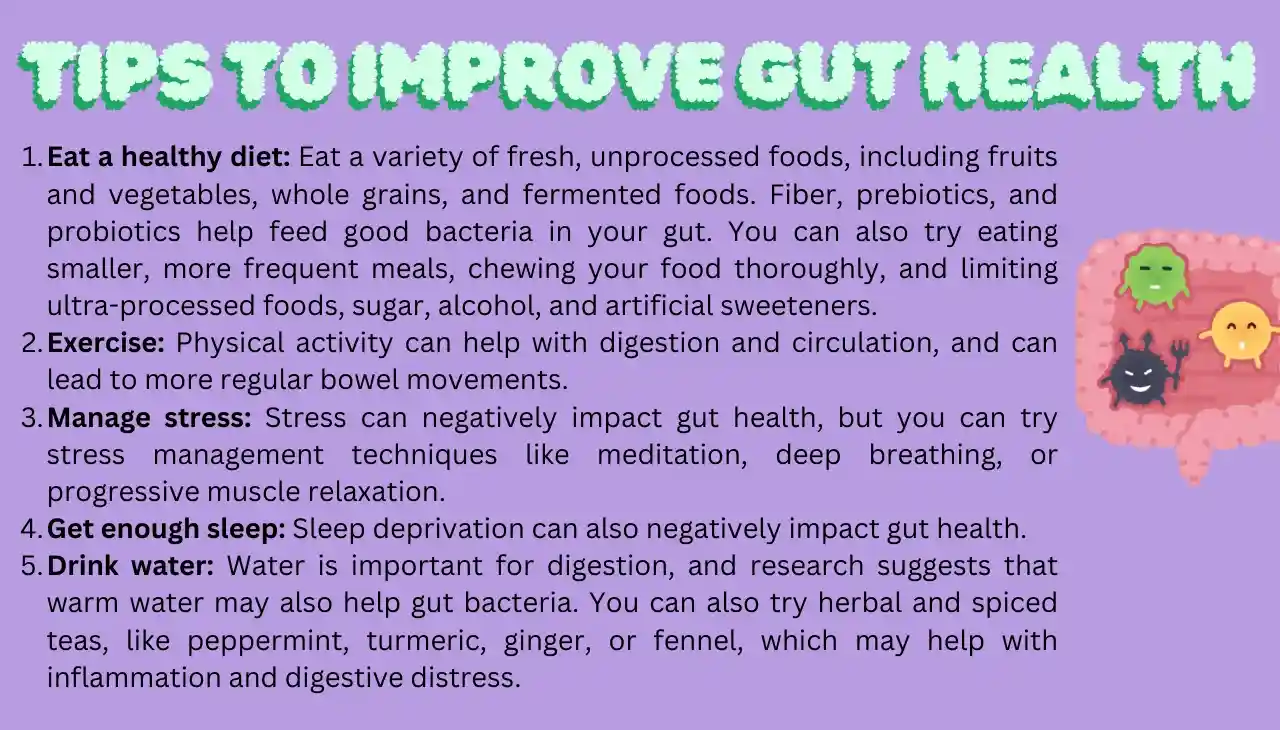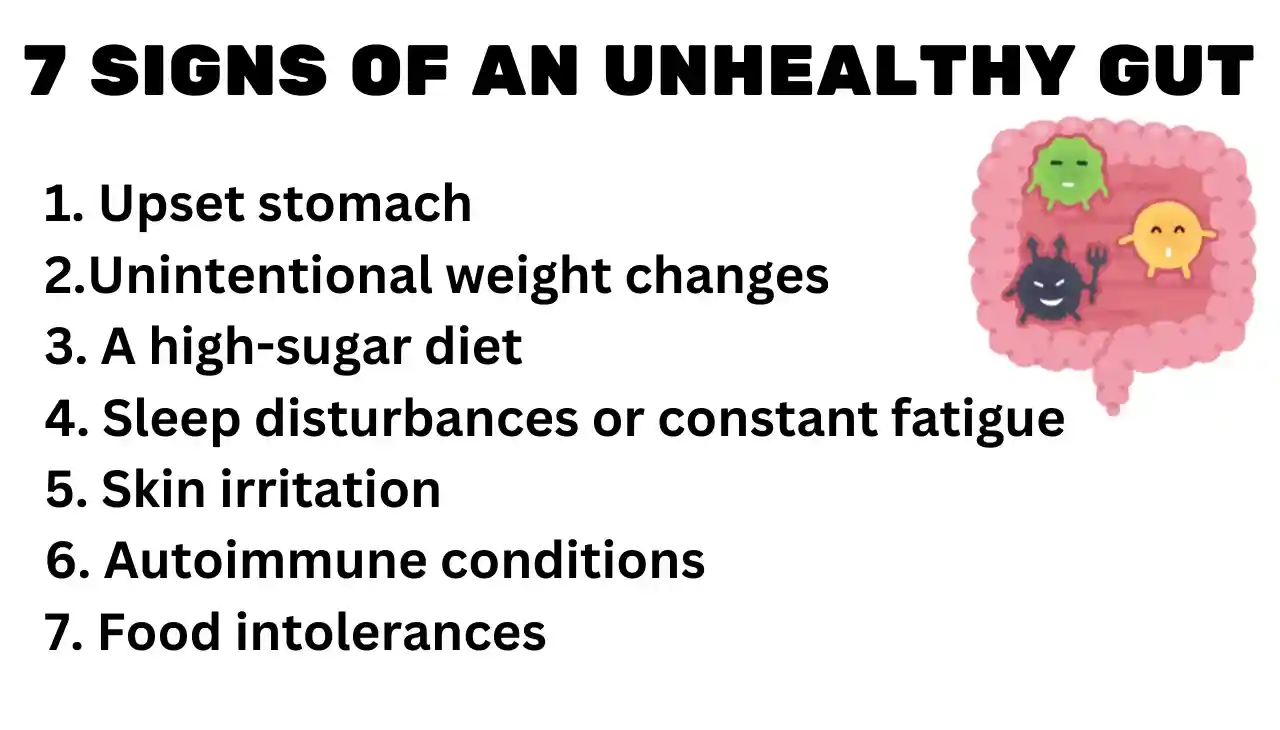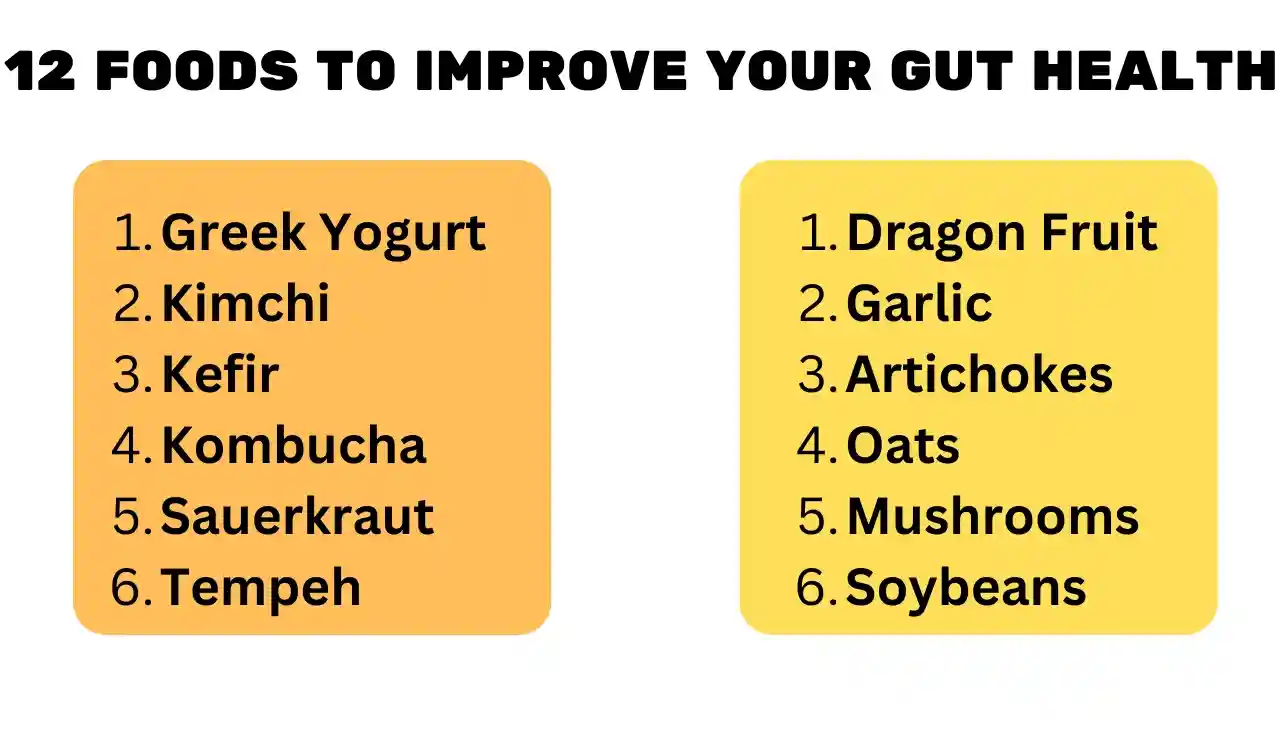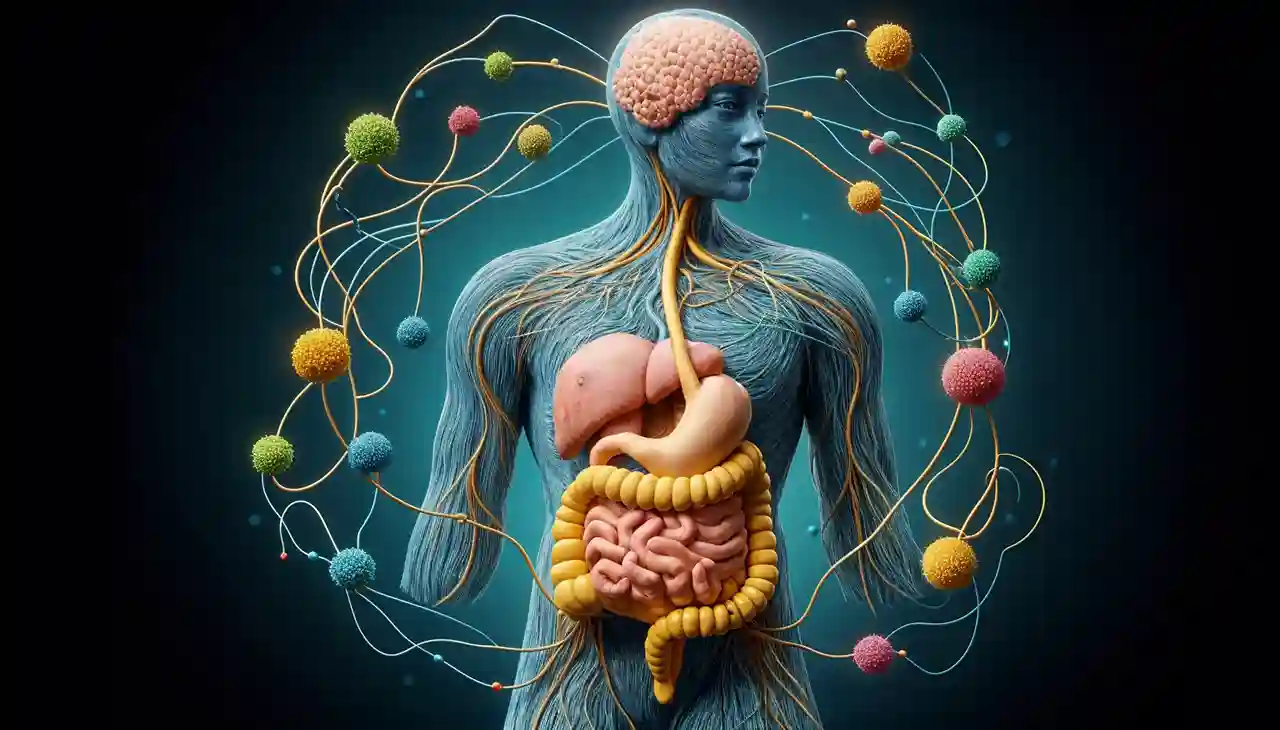Introduction
Have you ever stopped to consider the incredible ecosystem thriving within your digestive system? Your gut contains trillions of bacteria known as the gut microbiome. This bustling community plays a crucial role in your overall health and well-being, influencing everything from your digestion to your mood and immune function.
In this comprehensive guide, we’ll explore the fascinating world of gut health and provide you with practical, evidence-based strategies to nurture your digestive system naturally. Whether you’re dealing with occasional tummy troubles or simply want to optimize your gut function, this article has got you covered. So, let’s dive in and discover how you can improve your gut health from the inside out!

What is gut health
Gut health refers to the balance of bacteria found in your digestive tract. It refers to the whole gastrointestinal tract, including the stomach, small intestine, and large intestine. Your gut is responsible for breaking down food and absorbing nutrients required for general body function. A healthy stomach also helps to boost your immune system.
Improve your gut health naturally
Improving gut health naturally is critical to overall well-being. Here are some scientifically supported practices you may implement into your lifestyle:
- Include Gut-Friendly Foods:
- Kimchi: This spicy fermented cabbage is rich in probiotics, which support gut health.
- Kefir: A dairy-based drink containing beneficial bacteria that promote gut balance.
- Sauerkraut: Pickled cabbage with probiotics and fiber.
- Tempeh: A fermented soybean cake that’s protein-rich and gut-friendly.
- Reduce Sugar Intake:
- High-sugar diets can harm intestinal health. Choose healthy foods and reduce additional sugars.
- Stay Hydrated:
- Proper hydration improves digestion and nutrition absorption.
- Manage Stress:
- Chronic stress impairs gut health. Try relaxing techniques such as meditation or yoga.
- Get Enough Sleep:
- Poor sleep alters the gut microbiome. Make it a goal to get 7-9 hours of restful sleep each night.
- Exercise Regularly:
- Physical exercise improves gut microbes.
Remember that a diversified diet rich in fiber, whole foods, and fermented alternatives can help you maintain a healthy gut.
Improve your gut health naturally and bloating
Improving gut health naturally helps reduce bloating and boost overall health. Here are scientifically supported strategies:
- Identify the Cause:
- Understand what triggers bloating. Common causes include:
- Consuming fermented foods in your colon (fiber, sugar alcohols, and FODMAPs).
- Food intolerances (e.g., lactose or fructose intolerance).
- Swallowing excess air (chewing gum, drinking through a straw).
- Gut microbiome imbalances.
- Health conditions (IBD, IBS, endometriosis).
- Understand what triggers bloating. Common causes include:
- Limit Trigger Foods and Habits:
- Avoid foods like certain fruits, vegetables, grains, and sweeteners.
- Cut back on fatty foods (which slow digestion).
- Temporarily reduce high-fiber foods.
- Include Gut-Friendly Foods:
- Opt for:
- Fermented Foods: Kefir, kimchi, sauerkraut, and pickled ginger.
- Probiotics: Consider supplements or probiotic-rich foods.
- High-Fiber Sources: Whole grains, fruits, and vegetables.
- Opt for:
Individual responses vary, so listen to your body and seek medical attention if the bloating persists or worsens.

Worst and best food for gut health
Some foods might be harmful to gut health, while others are beneficial. Let’s consider both sides:
- Worst Foods for Gut Health:
- Animal Protein: Diets heavy in animal protein, particularly red meat, may harm the gut microbiota and cause inflammation.
- High FODMAP Foods: These can induce gastrointestinal problems, particularly in those with irritable bowel syndrome (IBS). Examples include processed foods containing high fructose corn syrup, agave, and some fruits.
- Foods Containing Antibiotics: Antibiotics taken indirectly through meat or dairy items may affect gut flora balance.
- Fried Foods: High-fat diets can impair digestion and harm gut health.
- Best Foods for Gut Health:
- Kimchi: A spicy Korean meal made with fermented vegetables.
- Sauerkraut: Another fermented dish rich in probiotics and beneficial to digestion.
- Kefir: A robust probiotic source, even more so than yogurt.
- Tempeh: A multipurpose fermented soy food that promotes digestive health and contains protein.
Individual reactions differ, so listen to your body and select meals that work best for you.
Increase good bacteria in gut naturally
Supporting the growth of good bacteria is key to naturally improving your gut health. Here are some science-backed practices you may implement in your everyday routine:
- Include Probiotic-Rich Foods:
- Sauerkraut: The tangy and crunchy fermented cabbage, is packed with gut-friendly probiotics.
- Yogurt with Live Cultures: Choose yogurt varieties that contain live active cultures.
- Kimchi: It is a flavorful and spicy Korean delicacy crafted from fermented vegetables.
- Kombucha: A fizzy, fermented tea.
- Embrace Fermented Foods:
- Fermented foods deliver helpful microorganisms into your intestines. Try kefir, cottage cheese, and kombucha.
- Eat Prebiotic Foods:
- Prebiotics provide nourishment for probiotics. They encourage the proliferation of good microorganisms.
- Asparagus, onions, garlic, and bananas are high-quality prebiotic foods.
- Increase Fiber Intake:
- Fiber-rich foods promote intestinal health by providing sustenance for beneficial microorganisms.
- Include vegetables, seeds, fruits, and whole grains in your diet.
- Limit Artificial Sweeteners and Processed Foods:
- Artificial sweeteners can harm gut microbes.
- Processed meals frequently lack fiber and important nutrients.
Remember that consistency is crucial. To support a healthy gut microbiota, gradually incorporate these modifications into your diet.

Supplements to improve gut health
Improving gut health requires a comprehensive strategy that includes food choices, lifestyle changes, and, if necessary, supplements. Here are some science-backed vitamins that can help your gut health:
- Probiotics:
- These live gut microbes contribute to a healthy balance of bacteria in your stomach.
- Look for probiotic-rich foods or high-quality supplements.
- Peppermint:
- Known for its antimicrobial, anti-inflammatory, and antioxidant properties, peppermint can soothe the digestive system.
- Inulin:
- A prebiotic vegetable fiber that nourishes beneficial gut bacteria.
- Find it in foods like artichokes and chicory root.
- Chamomile:
- Chamomile, a natural medicine for gastrointestinal issues, may help to relieve stomach pain.
- Ginger:
- Ginger, whether in liquid or tablet form, is anti-inflammatory and improves digestion.
- Psyllium:
- Provides constipation relief and supports gut health.
- Licorice Root:
- Acts as a mild laxative and has anti-inflammatory effects.
- L-glutamine:
- A key nutrient for intestinal health and repair.
- Slippery Elm:
- Slippery elm is derived from an endangered plant and contains polysaccharides that calm the intestinal lining.
- Collagen Protein Powder:
- Collagen, derived from Alaska pollock skin, promotes intestinal health and helps to prevent bloating.
- Wormwood:
- Wormwood, an extract from the Artemisia plant, may improve gastrointestinal function.
- Moringa Leaf Powder:
- A nutrient-dense tropical tree leaf that promotes general health and gastrointestinal function.
- Marshmallow Root:
- Fluids with antioxidants can help soothe the digestive tract.
- Artichokes:
- These vegetables offer liver benefits and contain prebiotic fiber.
- Bentonite Clay:
- Used for diarrhea and constipation, bentonite clay can help regulate gut function.
Remember to check with your doctor before beginning any new supplements, especially if you have any specific health issues or concerns.

Foods to improve gut health
Improving gut health entails eating foods that promote good intestinal microorganisms. Here are some scientifically supported options:
- Probiotic Foods:
- Kefir: A fermented dairy drink rich in probiotics.
- Kimchi: Spicy fermented vegetables with gut-friendly bacteria.
- Kombucha: A fizzy, fermented tea containing probiotics.
- Sauerkraut: Pickled cabbage with live cultures.
- Yogurt with Live Cultures: Choose varieties containing active probiotics.
- Prebiotic Foods:
- These nourish existing gut bacteria:
- Asparagus, onions, and garlic are excellent prebiotic sources.
- Bananas provide soluble fiber that supports gut health.
- These nourish existing gut bacteria:
- High-Fiber Foods:
- Include:
- Legumes (black beans, chickpeas).
- Whole Grains (oats, quinoa).
- Vegetables (broccoli, asparagus).
- Nuts (almonds, pistachios).
- Fruits (apples, peaches).
- Include:
Remember that a diversified diet rich in whole foods, fermented foods, and fiber supports gut health.
Understanding the Gut-Brain-Microbiome Connection
The gut-brain-microbiome axis is a complex network that connects the gut, brain, and microbiome. It’s like a superhighway of communication within the body, with the gut acting as a diverse population and the enteric nervous system (ENS) as its local government. The ENS, also known as the “second brain,” contains millions of neurons that constantly relay information to and from the central nervous system.
This communication means that what happens in the gut can impact mental health and vice versa. A healthy, diverse microbiome produces neurotransmitters like serotonin and helps regulate inflammation, which is linked to various mental health conditions. Nurturing gut health is crucial for supporting overall well-being, both physical and mental. Practical strategies to boost gut health naturally are available to help maintain this connection.

Tips to improve gut health
Nurturing Your Gut with a Healthy Diet
Incorporating High-Fiber Foods
- Fiber is crucial for gut bacteria, promoting short-chain fatty acids that nourish the gut lining.
- Plant-based foods like leafy greens, legumes, whole grains, berries, and nuts and seeds can increase fiber intake.
- Featured recipes include the Avocado and Black Bean Salad and Tangy Homemade Sauerkraut.
Embracing Fermented Foods
- Fermented foods, like yogurt, kefir, kombucha, kimchi, miso, and tempeh, can help diversify and strengthen the gut microbiome.
- Featured recipes include the Tangy Homemade Sauerkraut and the Omega-3 rich foods.
Including Nutrient-Dense and Anti-Inflammatory Ingredients
- Omega-3 rich foods, colorful fruits and vegetables, herbs and spices, bone broth, and extra virgin olive oil can support the gut lining and reduce inflammation.
- The Turmeric-Ginger Salmon with Roasted Vegetables recipe is an anti-inflammatory meal that provides the gut with the necessary nutrients.
- Variety is key in a wide range of colorful, whole foods to support a diverse and healthy gut microbiome.
Leveraging Lifestyle Practices for a Happy Gut
The Gut-Boosting Power of Physical Activity
- Regular exercise enhances gut motility and increases the diversity of the gut microbiome.
- Get moving and aim for a minimum of 150 minutes of moderate-intensity aerobic activity or 75 minutes of vigorous-intensity aerobic activity each week.
- Suggested Exercise Routine: A mix of cardio and strength training.
Stress, Relaxation, and Your Digestive System
- Chronic stress can disrupt the balance of your gut microbiome and exacerbate digestive issues.
- Engaging in regular stress-reduction activities can soothe your nervous system and your gut.
- Effective stress management techniques include meditation, deep breathing exercises, progressive muscle relaxation, journaling, and spending time in nature.
Prioritizing Quality Sleep for Optimal Gut Restoration
- Poor sleep can negatively impact your gut microbiome, and an unhealthy gut can disrupt your sleep patterns.
- Aim for 7-9 hours of quality sleep each night to give your gut the TLC it needs.
Tips for a Restful Night’s Sleep: Healthy Sleep Habits
- Stick to a consistent sleep schedule, create a relaxing bedtime routine, make your bedroom a sleep-friendly environment, limit exposure to blue light from screens, avoid large meals, caffeine, and alcohol close to bedtime, and consider using blackout curtains or a white noise machine if needed.
The Role of Supplements in Supporting Gut Health
Probiotics: Beneficial Bacteria for Gut
- Probiotics are live microorganisms that can restore gut microbiome balance.
- Consideration of probiotic supplements includes strain diversity, CFU count, survivability, and storage requirements.
- Different strains have different effects, so trial and error may be necessary.
Prebiotics: Fuel for Gut Bacteria
- Prebiotics feed gut bacteria, typically non-digestible fibers.
- Top prebiotic-rich foods include garlic, onions, leeks, asparagus, bananas, Jerusalem artichokes, chicory root, and Dandelion greens.
- Remember, prebiotic supplements are often made of inulin, galactooligosaccharides (GOS), and fructooligosaccharides (FOS).
Digestive Enzymes: Aiding Nutrient Absorption
- Digestive enzymes are like little helpers in your body, working hard to break down your food into smaller, absorbable parts. They’re the key to unlocking all the good stuff your body needs from the food you eat.
- Common digestive enzymes include Amylase, Lipase, Protease, and Lactase.
- Consultation with a healthcare provider is recommended before considering digestive enzyme supplements.
Omega-3 Fatty Acids: Anti-Inflammatory Support
- Omega-3 fatty acids, like EPA and DHA, are known for their powerful anti-inflammatory properties.
- Best food sources of omega-3 fatty acids for gut health include fatty fish, flaxseeds, chia seeds, walnuts, and algae and seaweed.
Strategies for a Resilient Gut Barrier
- Mindful Eating Practices: Eating slowly, chewing thoroughly, minimizing distractions, and appreciating food’s colors, smells, and textures can improve digestion and gut health.
- Hydration for Gut Health: Drinking at least 8 glasses of water daily, especially in hot weather or physical activity, is crucial for maintaining a healthy gut lining and regular bowel movements.
- Impact of Environmental Toxins on Gut Health: To minimize exposure to environmental toxins, choose organic produce, use natural cleaning products, opt for glass or stainless steel food storage containers, filter drinking water, and be mindful of personal care products.
- The Gut-Skin Connection: A healthy gut microbiome can contribute to clearer, more radiant skin by reducing inflammation, supporting nutrient absorption, and balancing hormones.

Knowing When to Seek Professional Guidance
Despite strategies supporting gut health, it’s essential to seek professional help when necessary, as certain signs suggest consulting a healthcare practitioner specializing in gut disorders.
- Persistent digestive symptoms (e.g., bloating, abdominal pain, diarrhea, constipation) that don’t improve with dietary changes
- Unexplained weight loss or gain
- Blood in your stool
- Severe or frequent heartburn
- Ongoing fatigue or unexplained joint pain
- Skin rashes or other skin issues that don’t respond to typical treatments
Remember, these symptoms can be indicative of various conditions, some of which require medical attention. Don’t hesitate to reach out to a healthcare provider if you’re concerned about your gut health.
The Importance of an Individualized Approach to Gut Health Treatment
When it comes to gut health, there’s no one-size-fits-all solution. Something that transforms one person’s life may not have the same impact on someone else. This is why an individualized approach is so crucial.
A healthcare practitioner specializing in gut health can help you:
- Identify potential food sensitivities or allergies
- Conduct appropriate testing to assess your gut health status
- Create a customized treatment strategy to specifically target and meet your individual requirements.
- Keep an eye on your progress and make any necessary adjustments to the plan.
They might use different of techniques and tools, such as:
- Comprehensive stool analysis
- Food sensitivity testing
- Breath tests for specific conditions (e.g., SIBO)
- Nutritional assessments
By working with a professional, you can get to the root cause of your gut issues and develop a targeted strategy for healing and long-term gut health.
Conclusion
Congratulations! You’ve just taken a deep dive into the fascinating world of gut health. From understanding the gut-brain-microbiome connection to exploring practical strategies for nurturing your digestive system, you’re now equipped with a wealth of knowledge to support your gut health journey.
Let’s recap some key takeaways:
- Your gut health is intricately connected to your overall well-being, including your mental health.
- A diverse, fiber-rich diet is fundamental to maintaining a healthy gut microbiome.
- Lifestyle factors like regular exercise, stress management, and quality sleep play crucial roles in supporting gut health.
- Certain supplements can provide additional support, but they should complement, not replace, a healthy diet and lifestyle.
- Environmental factors and personal care choices can impact your gut health.
- An individualized approach is often necessary for addressing persistent gut issues.
Remember, improving your gut health is not about perfection – it’s about progress. Start by incorporating one or two strategies that resonate with you and gradually build from there. Listen to your body, be patient with the process, and don’t hesitate to seek professional guidance when needed.
Your gut is a remarkable ecosystem that deserves your care and attention. By prioritizing your gut health, you’re not just supporting your digestive system – you’re investing in your overall health and well-being. Here’s to your journey towards a happier, healthier gut!
FAQ:
How long does it typically take to see improvements in gut health after making dietary and lifestyle changes?
Gut health improvements can take 2-4 weeks of consistent healthy habits, depending on factors like current gut health, changes being made, individual body composition and metabolism, and underlying health conditions. Positive changes may occur within a few days to a week, while more substantial changes may require 2-4 weeks of consistent habits. If improvements don't occur after 4-6 weeks, consulting a healthcare professional may be necessary to explore other potential factors affecting gut health.
Can I improve my gut health if I'm following a specific diet (like keto, vegan, or paleo)?
Gut health can be achieved through various dietary approaches. Keto diets focus on low-carb, high-fiber vegetables, fermented foods, and MCT oil. Vegan diets include a variety of plant-based foods, focusing on vitamin B12 and omega-3 intake. Paleo diets emphasize a variety of vegetables and fruits, fermented foods, and resistant starch sources. The key is to consume whole, unprocessed foods, plant-based foods, and stay hydrated. If you're concerned about meeting all nutritional needs, consider working with a registered dietitian to optimize your gut health.
I've heard that intermittent fasting can be good for gut health. Is this true?
Intermittent fasting (IF) has gained popularity for gut health benefits, such as promoting beneficial gut bacteria growth, reducing inflammation, and allowing the digestive system to rest and repair. However, research is still emerging, and its effects can vary from person to person. IF isn't suitable for everyone, especially those with a history of eating disorders or certain health conditions. Consult a healthcare professional before trying IF for gut health to determine if it's a good fit and ensure safe implementation.
Are there any specific gut health considerations for people over 50?
As we age, our gut microbiome changes, impacting digestive health and overall well-being. For older adults, it's essential to consume 25-30 grams of fiber daily to maintain regular bowel movements. A decrease in stomach acid can affect nutrient absorption, so consider fermented foods or supplements. Common medications can affect gut health, so consult with a healthcare provider. Dehydration is a risk for older adults, so ensure adequate water intake. Some probiotic strains may be beneficial for older adults. Regular, consistent changes can significantly improve gut health, regardless of age.
My child is a picky eater. How can I support their gut health?
To support gut health in picky eaters, follow these strategies: lead by example, make it fun, involve them in food preparation, introduce new foods gradually, focus on gut-friendly foods, consider sneaky vegetables, offer choices, try fermented foods, and consider a probiotic supplement. Children often mimic their parents' eating habits, so it's important to model good gut health practices. Involve them in food preparation and provide a sense of control. Offer choices between gut-healthy options and consider fermented foods for a tangy taste. Consult a pediatric nutritionist for personalized advice if concerned about your child's diet.




